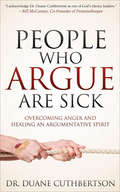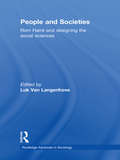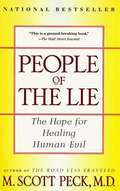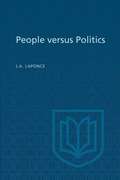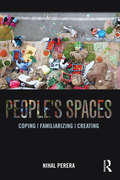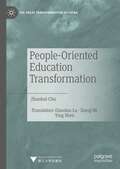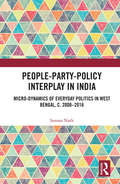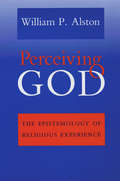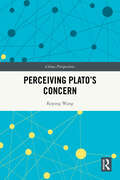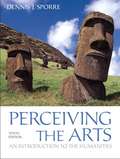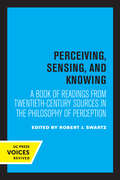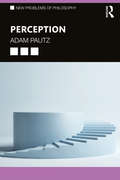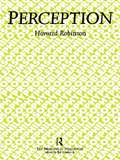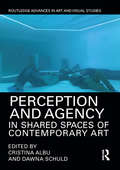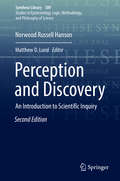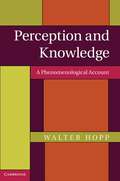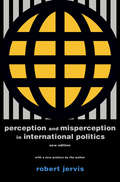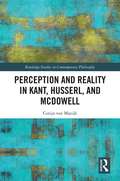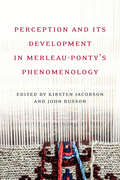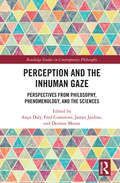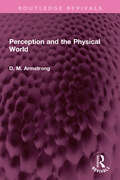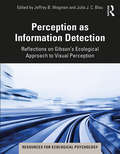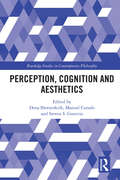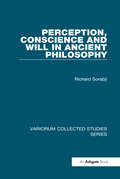- Table View
- List View
People Who Argue Are Sick: Overcoming Anger and Healing an Argumentative Spirit
by Duane CuthbertsonWe live in a world of anger and violence. National and international tensions surround us. It it possible to discern the source of such wrath? Dr. Cuthbertson will share with you that the “human spirit” can be “crushed” and “fractured.” Both temperament and environmental factors are involved. If you have ever had an argument, "People Who Ague Are Sick" is definitely for you. The author will give to you not only hope, but also a technique for healing. Let’s be bold. . ."People Who Ague Are Sick" has the potential to not only change you and your home, but to change the whole world. Through "People Who Ague Are Sick" you will learn that your argumentative spirit can be healed, you potentially have had your last argument, domestic violence can subside, there can be less violence in the world.
People and Societies: Rom Harré and Designing the Social Sciences (Routledge Advances in Sociology)
by Luk Van LangenhoveRom Harré has pushed the boundaries of our thinking about people and societies and has challenged the orthodox philosophy of science and social psychology. His countless books and articles have inspired generations of scholars in philosophy, psychology, linguistics, cognitive science and social theory. The diversity of his work makes that some see him as a leading figure in the critical realist school of philosophy of science, other as a key player in developing a social constructionist approach to psychology. The present volume brings together a careful selection of his key writings and presents them in a framework that stresses the evolution of his thinking as well as the place of his thinking in ongoing debates in different disciplines. The overall theme is the study of people and their ways of life. This is the first book that gives readers a systematic introduction in the conceptual universe of this towering figure.
People of the Lie: The Hope for Healing Human Evil
by M. Scott Peck<p>In this absorbing and equally inspiring companion volume to his classic trilogy—The Road Less Traveled, Further Along the Road Less Traveled, and The Road Less Traveled and Beyond—Dr. M. Scott Peck brilliantly probes into the essence of human evil. <p>People who are evil attack others instead of facing their own failures. Peck demonstrates the havoc these people of the lie work in the lives of those around them. He presents, from vivid incidents encountered in his psychiatric practice, examples of evil in everyday life. <p>This book is by turns disturbing, fascinating, and altogether impossible to put down as it offers a strikingly original approach to the age-old problem of human evil.</p>
People versus Politics: A study of opinions, attitudes, and perceptions in Vancouver-Burrard (The Royal Society of Canada Special Publications)
by J. A. LaponceThis lively and sophisticated study describes the opinions and attitudes of the electors in one electoral district (Vancouver-Burrard) during the federal and provincial elections held from 1963 to 1965. Based on interviews with a random sample of 800 people in the riding, it examines voting patterns in relation to age, sex, religion, ethnicity, social class, party preference, knowledge of politics, and level of education. Using these data Professor Laponce measures and identifies the distinguishing characteristics of voters and non-votes; of Liberals, Conservatives, New Democrats, and Social Creditors; of party "faithfuls" and party "migrants" (in particular those who support different parties in provincial and federal elections); and it describes the electors' attitudes to the parties competing for their support. The results of the study are compared to the results of surveys carried out in other parts of Canada, Britain, and the United States. Important sociologically for its contribution to research in the establishment of universal political patterns, this study also has immediate application to present political events in Canada and the United States.
People's Spaces: Coping, Familiarizing, Creating
by Nihal PereraWho controls space? Powerful corporations, institutions, and individuals have great power to create physical and political space through income and influence. People’s Spaces attempts to understand the struggle between people and institutions in the spaces they make. Current literature on cities and planning often looks at popular resistance to institutional authority through open, mass-movement protest. These views overlook the fact that subaltern classes are not often afforded the luxury of open, organized political protest. People’s Spaces investigates individual’s diverse approaches in reconciling the difference between their spatial needs and spatial availability. Through case studies in Southeast Asia, India, Nepal, and Central Asia, the book explores how people accommodate their spatial needs for everyday activities and cultural practices within a larger abstract spatial context produced by the power-holders.
People-Oriented Education Transformation (The Great Transformation of China)
by Zhaohui ChuThis book explores the reforms sweeping China's educational sector. Traditionally dominated by rote learning, China's educational system has increasingly been criticized by the rising middle class for failing to foster creativity, for arbitrary placement of students, and for fostering regional inequities. Reforms to make Chinese education "people-oriented" are slowly but surely gaining steam, as the sector embraces comprehensive reforms. This book will be of interest to journalists, educators, and China watchers.
People-Party-Policy Interplay in India: Micro-dynamics of Everyday Politics in West Bengal, c. 2008 – 2016
by Suman NathThis book analyses the political transition in West Bengal, India, which witnessed longest democratically elected Left regime of the world. It examines and compares micro-dynamics of political practices in India and delineates underlying political themes of state politics. The author explores the politics of land reform and the anti-land-acquisition movements which were critical points in the contemporary history of Bengal in independent India. The volume further delves into the caste and communal politics which had been latent until the Left Front’s loss in the state, as well as the what sets apart politics in West Bengal from other Indian states. Based on thorough ethnographic research, this volume will be of great interest to scholars and researchers of South Asian studies, politics and political processes, sociology and social anthropology.
Perceiving God
by William P. AlstonIn Perceiving God, William P. Alston offers a clear and provocative account of the epistemology of religious experience. He argues that the "perception of God" his term for direct experiential awareness of God makes a major contribution to the grounds of religious belief. Surveying the variety of reported direct experiences of God among laypersons and famous mystics, Alston demonstrates that a person can be justified in holding certain beliefs about God on the basis of mystical experience. Through the perception that God is sustaining one in being, for example, one can justifiably believe that God is indeed sustaining one in being. Alston offers a detailed discussion of our grounds for taking sense perception and other sources of belief including introspection, memory, and mystical experience to be reliable and to confer justification. He then uses this epistemic framework to explain how our perceptual beliefs about God can be justified. Alston carefully addresses objections to his chief claims, including problems posed by non-Christian religious traditions. He also examines the way in which mystical perception fits into the larger picture of grounds for religious belief. Suggesting that religious experience, rather than being a purely subjective phenomenon, has real cognitive value, Perceiving God will spark intense debate and will be indispensable reading for those interested in philosophy of religion, epistemology, and philosophy of mind, as well as for theologians.
Perceiving Plato's Concern (China Perspectives)
by Keping WangThis book mainly delves into the practical moral poetics in Plato's late masterpiece, the Laws, and applies a comparative approach to Plato's philosophizing and the Chinese way of thinking in the domains of art-making, cultivating a good life, and music-poetry education.Plato's main concern is psychic and correct education as the foundation of character building, coupled with the development of ideal guardians or perfect citizens. Such education requires a suitable use of allegories, myths, and poems, because it involves not only youngsters but also non-philosophers. Saturated with poetic wisdom, it enhances philosophical learning and human becoming in effect and sheds light on how to live a worthwhile life in praxis.What is discussed herein will interest students and scholars of ancient Greek philosophy, classical studies, art theory, Chinese thought and poetry education, among others.
Perceiving the Arts: An Introduction to the Humanities (10th Edition)
by Dennis J. SporreWritten for individuals who have little or no knowledge of the arts, Perceiving the Arts has a specific and limited purpose: to provide an introductory, technical, and respondent-related reference to the arts and literature. Intended to give basic information about each of the arts disciplines-drawing, painting, printmaking, photography, sculpture, architecture, music, theatre, dance, cinema, landscape architecture, and literature-the book seeks to give its readers touchstones concerning what to look and listen for in works of art and literature.
Perceiving, Sensing, and Knowing: A Book of Readings from Twentieth-Century Sources in the Philosophy of Perception (Topics in Philosophy #4)
by Robert J. SwartzThis title is part of UC Press's Voices Revived program, which commemorates University of California Press’s mission to seek out and cultivate the brightest minds and give them voice, reach, and impact. Drawing on a backlist dating to 1893, Voices Revived makes high-quality, peer-reviewed scholarship accessible once again using print-on-demand technology. This title was originally published in 1965.
Perception (New Problems of Philosophy)
by Adam PautzPerception is one of the most pervasive and puzzling problems in philosophy, generating a great deal of attention and controversy in philosophy of mind, psychology and metaphysics. If perceptual illusion and hallucination are possible, how can perception be what it intuitively seems to be, a direct and immediate access to reality? How can perception be both internally dependent and externally directed? Perception is an outstanding introduction to this fundamental topic, covering both the perennial and recent work on the problem. Adam Pautz examines four of the most important theories of perception: the sense datum view; the internal physical state view; the representational view; and naïve realism, assessing each in turn. He also discusses the relationship between perception and the physical world and the issue of whether reality is as it appears. Useful examples are included throughout the book to illustrate the puzzles of perception, including hallucinations, illusions, the laws of appearance, blindsight, and neuroscientific explanations of our experience of pain, smell and color. The book covers both traditional philosophical arguments and more recent empirical arguments deriving from research in psychophysics and neuroscience. The addition of chapter summaries, suggestions for further reading and a glossary of terms make Perception essential reading for anyone studying the topic in detail, as well as for students of philosophy of mind, philosophy of psychology and metaphysics.
Perception (Problems of Philosophy)
by Howard RobinsonQuestions about perception remain some of the most difficult and insoluble in both epistemology and in the philosophy of mind. This controversial but highly accessible introduction to the area explores the philosophical importance of those questions by re-examining what had until recent times been the most popular theory of perception - the sense-datum theory. Howard Robinson surveys the history of the arguments for and against the theory from Descartes to Husserl. He then shows that the objections to the theory, particularly Wittgenstein's attack on privacy and those of the physicalists, have been unsuccessful. He argues that we should return to the theory sense-data in order to understand perception. In doing so he seeks to overturn a consensus that has dominated the philosophy of perception for nearly half a century.
Perception and Agency in Shared Spaces of Contemporary Art (Routledge Advances in Art and Visual Studies)
by Cristina Albu Dawna SchuldThis book examines the interconnections between art, phenomenology, and cognitive studies. Contributors question the binary oppositions generally drawn between visuality and agency, sensing and thinking, phenomenal art and politics, phenomenology and structuralism, and subjective involvement and social belonging. Instead, they foreground the many ways that artists ask us to consider how we sense, think, and act in relation to a work of art.
Perception and Discovery: An Introduction to Scientific Inquiry (Synthese Library #389)
by Norwood Russell HansonMatthew D. LundNorwood Russell Hanson was one of the most important philosophers of science of the post-war period. Hanson brought Wittgensteinian ordinary language philosophy to bear on the concepts of science, and his treatments of observation, discovery, and the theory-ladenness of scientific facts remain central to the philosophy of science. Additionally, Hanson was one of philosophy’s great personalities, and his sense of humor and charm come through fully in the pages of Perception and Discovery.Perception and Discovery, originally published in 1969, is Hanson’s posthumous textbook in philosophy of science. The book focuses on the indispensable role philosophy plays in scientific thinking. Perception and Discovery features Hanson’s most complete and mature account of theory-laden observation, a discussion of conceptual and logical boundaries, and a detailed treatment of the epistemological features of scientific research and scientific reasoning. This book is of interest to scholars of philosophy of science, particularly those concerned with Hanson’s thought and the development of the discipline in the middle of the 20th century. However, even fifty years after Hanson’s early death, Perception and Discovery still has a great deal to offer all readers interested in science.
Perception and Knowledge: A Phenomenological Account
by Walter HoppThis book offers a provocative, clear and rigorously argued account of the nature of perception and its role in the production of knowledge. Walter Hopp argues that perceptual experiences do not have conceptual content, and that what makes them play a distinctive epistemic role is not the features which they share with beliefs, but something that in fact sets them radically apart. He explains that the reason-giving relation between experiences and beliefs is what Edmund Husserl called 'fulfilment' - in which we find something to be as we think it to be. His book covers a wide range of central topics in contemporary philosophy of mind, epistemology and traditional phenomenology. It is essential reading for contemporary analytic philosophers of mind and phenomenologists alike.
Perception and Misperception in International Politics
by Robert JervisWith a new preface by the authorSince its original publication in 1976, Perception and Misperception in International Politics has become a landmark book in its field, hailed by the New York Times as "the seminal statement of principles underlying political psychology." This new edition includes an extensive preface by the author reflecting on the book's lasting impact and legacy, particularly in the application of cognitive psychology to political decision making, and brings that analysis up to date by discussing the relevant psychological research over the past forty years. Jervis describes the process of perception (for example, how decision makers learn from history) and then explores common forms of misperception (such as overestimating one's influence). He then tests his ideas through a number of important events in international relations from nineteenth- and twentieth-century European history. Perception and Misperception in International Politics is essential for understanding international relations today.
Perception and Reality in Kant, Husserl, and McDowell (Routledge Studies in Contemporary Philosophy)
by Corijn van MazijkHow does perception give us access to external reality? This book critically engages with John McDowell’s conceptualist answer to this question, by offering a new exploration of his views on perception and reality in relation to those of Immanuel Kant and Edmund Husserl. In six chapters, the book examines these thinkers’ respective theories of perception, lucidly describing how they fit within their larger philosophical views on mind and reality. It thereby not only reveals the continuity of a tradition that underlies today’s fragmented scholarly landscape, but also yields a new critique of McDowell’s conceptualist theory. In doing so, the book contributes to the ongoing bridging of traditions, by combining analytic philosophy, Kantian philosophy, and phenomenology. Perception and Reality in Kant, Husserl, and McDowell will appeal to scholars and students working in the history of philosophy, phenomenology, Kantian philosophy, and in particular the philosophy of perception.
Perception and its Development in Merleau-Ponty's 'Phemenology'
by John Russon Kirsten JacobsonFrench phenomenologist Maurice Merleau-Ponty (1908–1961) shifted the terrain of western philosophy when he identified the body, rather than consciousness, as the primary site of our meaningful engagement with the world. His magnum opus, The Phenomenology of Perception (1945), revolutionized work in philosophy, psychology, cognitive science and other fields. Perception and Its Development in Merleau-Ponty’s Phenomenology brings together essays from fifteen leading Merleau-Ponty scholars to demonstrate the continuing significance of Merleau-Ponty’s analysis. Mirroring the progression found in Merleau-Ponty's Phenomenology of Perception, the essays in this volume engage in original phenomenological research to demonstrate the dynamic development of perceptual life from perception's most foundational forms (spatiality, temporality, intentionality, etc.) to its richest articulations in political life and artistic activity. This comprehensive volume is a powerful resource for students and scholars alike studying Merleau-Ponty’s philosophy and serves both as a commentary upon and companion to his The Phenomenology of Perception.
Perception and the Inhuman Gaze: Perspectives from Philosophy, Phenomenology, and the Sciences (Routledge Studies in Contemporary Philosophy)
by Dermot Moran Anya Daly Fred Cummins James JardineThe diverse essays in this volume speak to the relevance of phenomenological and psychological questioning regarding perceptions of the human. This designation, human, can be used beyond the mere identification of a species to underwrite exclusion, denigration, dehumanization and demonization, and to set up a pervasive opposition in Othering all deemed inhuman, nonhuman, or posthuman. As alerted to by Merleau-Ponty, one crucial key for a deeper understanding of these issues is consideration of the nature and scope of perception. Perception defines the world of the perceiver, and perceptual capacities are constituted in engagement with the world – there is co-determination. Moreover, the distinct phenomenology of perception in the spectatorial mode in contrast to the reciprocal mode, deepens the intersubjective and ethical dimensions of such investigations. Questions motivating the essays include: Can objectification and an inhuman gaze serve positive ends? If so, under what constraints and conditions? How is an inhuman gaze achieved and at what cost? How might the emerging insights of the role of perception into our interdependencies and essential sociality from various domains challenge not only theoretical frameworks, but also the practices and institutions of science, medicine, psychiatry and justice? What can we learn from atypical social cognition, psychopathology and animal cognition? Could distortions within the gazer’s emotional responsiveness and habituated aspects of social interaction play a role in the emergence of an inhuman gaze? Perception and the Inhuman Gaze will interest scholars and advanced students working in phenomenology, philosophy of mind, psychology, psychiatry, sociology and social cognition.
Perception and the Physical World (Routledge Revivals)
by D M ArmstrongFirst published in 1961, Perception and the Physical World contends that there are insuperable difficulties for the Representative and Phenomenalist theories. Unreflective common sense thinks of sense-perception as a direct grasping of the nature of the physical world. But when we are confronted with facts about sensory illusion, about the physical and physiological causes of perception, and with modern scientific views of the real nature of matter, it is hard to maintain such a ‘Direct Realist’ theory of perception. We tend to substitute a Copy or Representative theory which puts sense-impressions between ourselves and physical reality. Some philosophers overwhelmed by the difficulties of the Copy theory, retreat into Phenomenalism, which identifies the physical world with our sense-impressions. The author re-examines all the traditional objections to a Direct Realist theory and tries to show that they can be overcome. This book will be of interest to students of philosophy.
Perception as Information Detection: Reflections on Gibson’s Ecological Approach to Visual Perception (Resources for Ecological Psychology Series)
by Jeffrey B. Wagman Julia J. C. BlauThis book provides a chapter-by-chapter update to and reflection on of the landmark volume by J.J. Gibson on the Ecological Approach to Visual Perception (1979). Gibson’s book was presented a pioneering approach in experimental psychology; it was his most complete and mature description of the ecological approach to visual perception. Perception as Information Detection commemorates, develops, and updates each of the sixteen chapters from Gibson’s volume. The book brings together some of the foremost perceptual scientists in the field, from the United States, Europe, and Asia, to reflect on Gibson’s original chapters, expand on the key concepts discussed and relate this to their own cutting-edge research. This connects Gibson’s classic with the current state of the field, as well as providing a new generation of students with a contemporary overview of the ecological approach to visual perception. Perception as Information Detection is an important resource for perceptual scientists as well as both undergraduates and graduates studying sensation and perception, vision, cognitive science, ecological psychology, and philosophy of mind.
Perception as Information Detection: Reflections on Gibson’s Ecological Approach to Visual Perception (Resources for Ecological Psychology Series)
by Jeffrey B. Wagman Julia J. C. BlauThis book provides a chapter-by-chapter update to and reflection on of the landmark volume by J.J. Gibson on the Ecological Approach to Visual Perception (1979).Gibson’s book was presented a pioneering approach in experimental psychology; it was his most complete and mature description of the ecological approach to visual perception. Perception as Information Detection commemorates, develops, and updates each of the sixteen chapters from Gibson’s volume. The book brings together some of the foremost perceptual scientists in the field, from the United States, Europe, and Asia, to reflect on Gibson’s original chapters, expand on the key concepts discussed and relate this to their own cutting-edge research. This connects Gibson’s classic with the current state of the field, as well as providing a new generation of students with a contemporary overview of the ecological approach to visual perception.Perception as Information Detection is an important resource for perceptual scientists as well as both undergraduates and graduates studying sensation and perception, vision, cognitive science, ecological psychology, and philosophy of mind.
Perception, Cognition and Aesthetics (Routledge Studies in Contemporary Philosophy)
by Steven S. Gouveia Dena Shottenkirk Manuel CuradoThis volume addresses key questions related to how content in thought is derived from perceptual experience. It includes chapters that focus on single issues on perception and cognition, as well as others that relate these issues to an important social construct that involves both perceptual experience and cognitive activities: aesthetics. While the volume includes many diverse views, several prominent themes unite the individual essays: a challenge to the notion of the discreet, and non-temporal, unit of perception, a challenge to the traditional divide between perception and cognition, and a challenge to the traditional divide between unconscious and conscious intentionality. Additionally, the chapters discuss the content of perceptual experience, the value of traditional notions of content, disjunctivism, adverbialism, and phenomenal experience. The final section of essays dealing with perception and cognition in aesthetics features work in experimental aesthetics and unique perspectives from artists and gallerists working outside of philosophy. Perception, Cognition and Aesthetics is a timely volume that offers a range of unique perspectives on debates in philosophy of mind surrounding perception and cognition. It will also appeal to scholars working in aesthetics and art theory who are interested in the ways these debates influence our understanding of art.
Perception, Conscience and Will in Ancient Philosophy (Variorum Collected Studies)
by Richard SorabjiThis book is about the human mind in ancient philosophy, with a focus on sense perception, a subject that Richard Sorabji has previously treated more in articles than in books. But it finishes with chapters offering a distinctive view on moral conscience and will. Sense perception raises the further questions of the mind-body relation, of self-awareness, of infinite divisibility and the continuum, of the capacities of animals and children and of the relation between perception and reason. On all topics the introduction interconnects the papers and presents fresh material to fill out the picture. For the topic that has proved most popular, the physiological process in sense perception, a bibliography is provided as well as the latest update. The introduction interconnects the papers and fills out the picture by reference to other writings and to further thoughts. On the final topic, the will, it takes account of a different view that appeared only when the book was in preparation. The picture of the main topics shows that each continued to develop into a richer and richer account throughout the 1200 year course of Ancient Greek Philosophy up to 600 CE.
